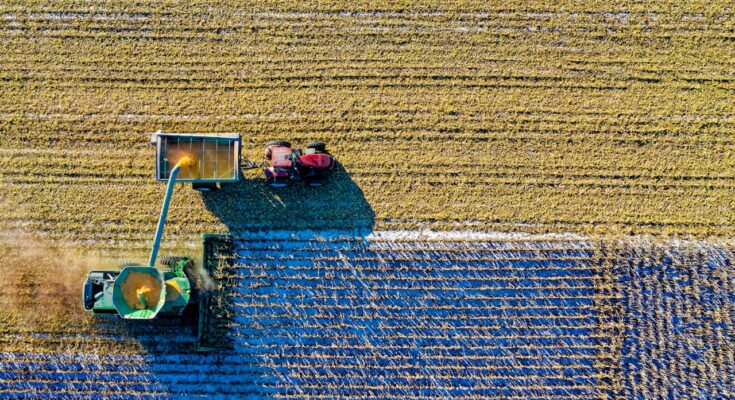Canada’s agricultural sector is experiencing unprecedented growth, creating lucrative opportunities for both seasonal and permanent farm workers. With average salaries ranging from $35,000 for seasonal positions to over $75,000 for specialized agricultural roles, farm work in Canada offers competitive compensation, valuable immigration pathways, and the satisfaction of feeding the nation.
Whether you’re an international worker seeking Canadian immigration through agricultural employment or someone looking for meaningful outdoor work with excellent growth potential, Canada’s farming industry provides clear career advancement paths, comprehensive benefits, and opportunities to build a sustainable future in one of the world’s most food-secure nations.
The Canadian Agricultural Landscape: A Growing Industry
Current Market Conditions and Opportunities
Canada’s agricultural sector contributes over $100 billion annually to the national economy, employing more than 2.3 million people across diverse farming operations. The industry faces a significant labor shortage, creating exceptional opportunities for motivated workers:
- Labor demand: 60,000+ vacant positions annually across all agricultural sectors
- Seasonal peaks: Summer harvest periods requiring 25,000+ temporary workers
- Permanent growth: Year-round positions increasing by 8% annually
- Technology integration: Modern farming creating higher-skilled, better-paid positions
Key Growth Sectors:
- Greenhouse vegetable production in Ontario and British Columbia
- Grain and oilseed operations across Prairie provinces
- Fruit orchards in British Columbia’s Okanagan Valley
- Dairy and livestock operations in Quebec and Ontario
- Organic farming operations nationwide
This expansion directly translates to job security, competitive wages, and accelerated paths to permanent residence for qualified agricultural workers.
Farm Work Salaries in Canada: Comprehensive Earning Potential
Seasonal Agricultural Positions
Fruit and Vegetable Harvesting:
- Seasonal earnings: $25,000 – $40,000 (4-6 months)
- Hourly rates: $15.50 – $22.00 (varies by province)
- Piece-rate opportunities: $40,000+ for experienced harvesters
- Housing and meals often provided
General Farm Labor:
- Annual seasonal income: $30,000 – $45,000
- Daily rates: $120 – $180 for experienced workers
- Overtime premiums during peak seasons
- Performance bonuses common
Greenhouse Operations:
- Year-round positions: $35,000 – $50,000 annually
- Specialized roles: $40,000 – $60,000
- Supervisor positions: $45,000 – $65,000
- Climate-controlled working conditions
Permanent Agricultural Careers
Equipment Operators:
- Combine operators: $45,000 – $70,000 annually
- Tractor specialists: $40,000 – $60,000
- Heavy machinery operators: $50,000 – $80,000
- Maintenance technicians: $55,000 – $75,000
Specialized Agricultural Roles:
- Livestock managers: $50,000 – $85,000
- Crop specialists: $55,000 – $90,000
- Farm supervisors: $60,000 – $100,000
- Agricultural technicians: $45,000 – $75,000
Management and Ownership:
- Farm managers: $70,000 – $120,000+
- Agricultural consultants: $80,000 – $150,000
- Farm ownership: Unlimited earning potential
- Agribusiness opportunities: $100,000 – $250,000+
Success Story: Carlos Mendoza arrived in Canada through the Seasonal Agricultural Worker Program, earning $32,000 in his first season picking apples in British Columbia. After three seasons, he transitioned to a permanent position as an orchard supervisor, now earning $68,000 annually with full benefits and is in the process of obtaining permanent residence.
Immigration Pathways Through Agricultural Work
Temporary Foreign Worker Program (TFWP)
Seasonal Agricultural Worker Program (SAWP):
- Duration: Up to 8 months annually
- Participating countries: Mexico, Caribbean nations
- Housing and transportation provided
- Path to longer-term opportunities
Agricultural Stream:
- Year-round positions available
- Labor Market Impact Assessment (LMIA) required
- Processing time: 8-16 weeks
- Leads to permanent residence eligibility
Permanent Immigration Through Agriculture
Provincial Nominee Programs (PNP):
Manitoba PNP – Farm Investor Pathway:
- Investment requirement: $300,000+ in farming operation
- Business plan and experience required
- Fast-track to permanent residence
Saskatchewan Immigrant Nominee Program:
- Farm owners and operators priority stream
- Agricultural workers with job offers
- Experience in crop or livestock operations valued
Rural and Northern Immigration Pilot:
- Small community agricultural positions
- Community-specific job opportunities
- Accelerated permanent residence process
Express Entry Pathways
Canadian Experience Class (CEC):
- One year Canadian agricultural work experience
- Language requirements: CLB 5-7 depending on position
- Supervisory experience receives additional points
Federal Skilled Worker Program:
- Agricultural occupations included in priority lists
- Education and language requirements
- Work experience in agriculture valued
Types of Farm Work Opportunities Across Canada
Crop Production Operations
Grain and Oilseed Farming:
- Provinces: Saskatchewan, Alberta, Manitoba
- Season: April through October
- Roles: Seeding, spraying, harvesting, grain handling
- Earnings: $35,000 – $65,000 depending on experience
- Equipment: Modern GPS-guided machinery
Vegetable Production:
- Primary locations: Ontario, Quebec, British Columbia
- Season: May through September
- Positions: Planting, cultivation, harvesting, packaging
- Specializations: Organic farming, greenhouse operations
- Income range: $30,000 – $55,000
Livestock and Dairy Operations
Dairy Farming:
- Major regions: Quebec, Ontario, British Columbia
- Work type: Year-round permanent positions
- Responsibilities: Animal care, milking, feed management
- Career progression: Herd manager to farm ownership
- Salary range: $40,000 – $80,000+
Cattle Ranching:
- Locations: Alberta, Saskatchewan, Manitoba
- Seasons: Year-round with seasonal intensity variations
- Duties: Cattle management, breeding programs, pasture maintenance
- Advancement: Ranch foreman to ownership opportunities
- Compensation: $35,000 – $75,000
Specialty Agricultural Sectors
Organic Farming Operations:
- Growth rate: 15% annually
- Premium wages: 10-20% above conventional farming
- Certification requirements: Organic standards training
- Market demand: High-value crops and livestock
- Career potential: Consulting and specialized management
Agritourism and Direct Sales:
- Combination roles: Farming and customer service
- Seasonal businesses: Farm-to-table operations
- Skills required: Agricultural knowledge plus hospitality
- Income potential: $40,000 – $85,000 including seasonal bonuses
Career Journey: Elena Popov started as a seasonal greenhouse worker in Ontario earning $28,000. She completed agricultural certificates during off-seasons, advanced to production supervisor earning $52,000, and recently secured permanent residence. She’s now planning to purchase her own greenhouse operation with business partners.
Best Provinces for Agricultural Employment
Saskatchewan – The Heartland
Why Saskatchewan Leads:
- Largest agricultural production by land area
- Diverse crop and livestock operations
- Strong Provincial Nominee Program for agriculture
- Lower cost of living with competitive wages
Opportunities:
- Grain farming: Wheat, canola, lentils
- Livestock: Cattle, pork, poultry
- Average agricultural wages: $42,000 – $70,000
Ontario – Diversified Agriculture Hub
Ontario Advantages:
- Most diverse agricultural sector in Canada
- Proximity to major population centers
- Advanced greenhouse and specialty crop operations
- Strong food processing industry connections
Key Sectors:
- Greenhouse vegetables, fruit orchards, dairy
- Wine country operations in Niagara
- Salary range: $35,000 – $75,000
Alberta – Innovation and Scale
Alberta Strengths:
- Large-scale mechanized operations
- Cattle ranching and feedlot operations
- Advanced agricultural technology adoption
- Strong economy supporting higher wages
Primary Focus:
- Grain production, cattle ranching, dairy
- Agricultural technology and precision farming
- Compensation: $40,000 – $85,000
British Columbia – Premium Agriculture
BC Opportunities:
- High-value crop production
- Wine industry and fruit orchards
- Organic and sustainable farming focus
- Export market connections to Asia
Specialty Areas:
- Fraser Valley dairy and poultry
- Okanagan fruit production, Peace River grain
- Wage premiums: $38,000 – $80,000
Essential Skills and Qualifications for Agricultural Success
Technical Agricultural Skills
Equipment Operation:
- Tractor and implement operation
- GPS and precision agriculture technology
- Irrigation system management
- Livestock handling equipment
Crop and Animal Knowledge:
- Plant biology and growth cycles
- Pest and disease identification
- Animal husbandry and health
- Soil management and fertility
Transferable Professional Skills
Physical and Mental Requirements:
- Physical stamina for outdoor work
- Problem-solving and decision-making
- Weather adaptability and resilience
- Safety consciousness and attention to detail
Communication and Teamwork:
- Ability to work in multicultural teams
- Basic English or French communication
- Following instructions and safety protocols
- Leadership potential for advancement
Training and Development in Canadian Agriculture
Industry Certification Programs
Agricultural Certifications:
- Pesticide application licenses
- Animal welfare and handling certifications
- Organic production standards
- Food safety and quality assurance (HACCP)
Equipment and Safety Training:
- Heavy equipment operation licenses
- Workplace safety certifications
- First aid and emergency response
- Environmental stewardship training
Educational Advancement Opportunities
Agricultural Colleges and Universities:
- University of Guelph (Ontario) – Agricultural programs
- University of Saskatchewan – Agriculture and Bioresources
- Olds College (Alberta) – Applied agriculture programs
- Part-time and online learning options available
Employer-Sponsored Development:
- On-farm training and mentorship programs
- Equipment manufacturer certification courses
- Leadership development for supervisory roles
- Business management training for ownership paths
Navigating Agricultural Employment: Practical Steps
Finding Agricultural Employment
Job Search Resources:
- Job Bank Canada agricultural listings
- Provincial agricultural associations
- Farm employment agencies and recruiters
- Direct contact with agricultural operations
Application Strategies:
- Emphasize physical capabilities and work ethic
- Highlight any relevant experience or training
- Demonstrate cultural adaptability and language skills
- Show commitment to agricultural career development
Work Permit and Immigration Process
Documentation Requirements:
- Valid passport and medical examination
- Police clearance certificates
- Educational credential assessments
- Language test results for permanent programs
Timeline Planning:
- Seasonal positions: Apply 3-6 months in advance
- Permanent positions: 6-12 months processing
- Immigration applications: 12-24 months total timeline
- Plan for multi-year progression strategy
Frequently Asked Questions
Q: Can international workers get farm jobs in Canada without agricultural experience? A: Yes, many agricultural employers provide comprehensive training for motivated workers. Physical fitness, reliability, and willingness to learn are often more important than prior experience. Seasonal programs specifically recruit workers without agricultural backgrounds.
Q: What are the living arrangements for seasonal agricultural workers? A: Most seasonal agricultural programs provide housing, either on-farm accommodations or nearby housing facilities. This typically includes basic furnishings, utilities, and sometimes meal services. Housing costs are usually deducted from wages at reasonable rates.
Q: How can seasonal agricultural work lead to permanent residence? A: Seasonal workers can transition to permanent positions after demonstrating reliability and skills. One year of Canadian work experience qualifies for Canadian Experience Class immigration. Some provinces have specific agricultural immigration streams.
Q: What is the physical demand of agricultural work? A: Agricultural work is physically demanding, involving outdoor work in various weather conditions, lifting, and extended periods of standing or operating equipment. However, modern farming uses significant mechanization, reducing physical demands compared to traditional farming.
Q: Are there opportunities for career advancement in Canadian agriculture? A: Absolutely. Agriculture offers clear advancement paths from general labor to equipment operation, supervision, management, and farm ownership. Many successful farmers started as seasonal workers and built careers through experience, training, and dedication.
Your Agricultural Future in Canada Awaits
Working in Canada’s agricultural sector offers something unique in today’s economy: the opportunity to build a meaningful career while contributing to one of humanity’s most essential industries. Yes, agricultural work can be physically demanding and weather-dependent. But it’s also deeply satisfying work that connects you to the land, the seasons, and the fundamental process of feeding people.
What makes agricultural careers particularly rewarding is the tangible impact of your work. Whether you’re helping harvest the grain that becomes bread on family tables or caring for livestock that provides nutrition to communities, your role matters in fundamental ways. Every day in agriculture brings new challenges and learning opportunities, from understanding soil conditions to mastering advanced machinery to developing business skills.
For international workers, agricultural employment offers an especially valuable pathway to building a new life in Canada. The skills you develop are transferable and respected, the experience you gain opens doors to permanent residence, and the connections you make often become lifelong friendships and business partnerships. Many of today’s successful Canadian farmers started exactly where you are now – looking for opportunity and willing to work hard to achieve it.
The agricultural community in Canada is known for its welcoming nature and willingness to mentor newcomers. Farmers understand that their success depends on dedicated, skilled workers, and they’re often generous with their knowledge and support. This creates an environment where your dedication and learning are recognized and rewarded.
Remember that agriculture is evolving rapidly with new technologies, sustainable practices, and innovative business models. The industry needs fresh perspectives, diverse experiences, and people who can adapt to changing conditions. Your background, whatever it may be, brings value to Canadian agriculture.
Your agricultural journey in Canada is waiting to begin. Whether you’re drawn by the immigration opportunities, the competitive compensation, the outdoor lifestyle, or simply the satisfaction of meaningful work, take that first step. Research programs, update your application materials, and reach out to potential employers. Every successful agricultural career starts with someone brave enough to plant the first seed of opportunity.



